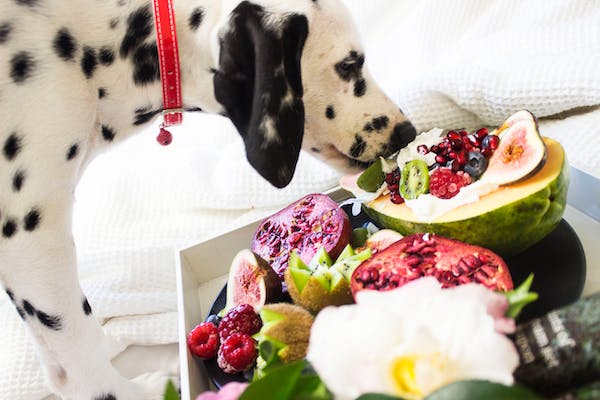Yes, guava is bad for dogs, but dogs can eat guava in small portions as an occasional treat. Guava is a nutritious tropical fruit that is commonly eaten around the world. However, some dog owners wonder if guava is bad for dogs to eat. In this article, we’ll explore whether guava is terrible for dogs and provide tips on feeding guava to dogs safely.
Table of Contents
An Overview of Guava

Guava is a sweet, aromatic fruit that grows on small trees or shrubs in tropical and subtropical regions. The most common guava is the apple, which has light green skin and sweet, white, or pink flesh.
Guava is rich in nutrients like vitamin C, lycopene, and fiber. It also contains beneficial plant compounds that act as antioxidants. For these reasons, guava is considered a superfood for humans.
So how does this nutritional profile translate for dogs? Let’s find out if guava’s health benefits also apply to dogs.
Is Guava Safe for Dogs to Eat?
The answer is yes—guava is generally safe for dogs to eat.
Guava contains vitamin C, fiber, and other nutrients for your dog’s health. The flesh and seeds of the guava fruit contain no known toxins that are hazardous to dogs.
Guava seeds do contain compounds that can have a laxative effect. But the small amount of seeds in a few guava slices is unlikely to cause issues. Still, removing the seeds before feeding guava is best to avoid any stomach upset.
Guava leaves and skin also have a higher concentration of plant compounds and should not be fed to dogs. But the pink or white flesh of the fruit is excellent for canine consumption. Generally, guava is good for dogs and provides them with vitamin C and other nutrients.
You May Also Like: IS CHERRY PIE SAFE FOR DOGS?
Potential Benefits of Feeding Guava to Dogs
Here are some of the top benefits of adding guava as an occasional treat for dogs:
- Rich in vitamin C, Guava contains 4 to 5 times more vitamin C than oranges. Vitamin C helps support your dog’s immune system and wound healing.
- Good source of fiber: The fiber in guava can help promote regular bowel movements and aid your dog’s digestive health.
- Antioxidants: Lycopene and other antioxidants in guava can help neutralize free radicals and reduce inflammation. These compounds support your dog’s immune defences.
- Low glycemic index: Guava does not cause a sharp spike in blood sugar, making it a good choice for diabetic dogs or dogs who need to maintain steady energy levels.
- Supports oral health: Chewing guava can clean your dog’s teeth and gums while delivering essential nutrients. The antibacterial compounds in guava also protect against bad breath.
So while guava is not a necessary part of a dog’s diet, it does provide some excellent health bonuses, so dogs can eat guava. A few pieces of guava can be a nutritious snack or an addition to your dog’s mealtime routine.
Tips for Feeding Guava to Dogs
When introducing guava, follow these tips for keeping your dog safe:
- Remove all seeds first. The seeds can obstruct your dog’s intestines if consumed whole.
- Feed in moderation. Too much guava can cause loose stools. Limit treats to 10% of your dog’s daily calories.
- Cut into bite-sized pieces. Cut the guava into small chunks to prevent choking.
- Supervise your dog. Monitor your dog when giving guava to prevent inhalation of chunks.
- Rinse thoroughly. Wash the guava to remove any pesticide residues.
- Avoid the skin. The outer rind contains higher pesticide levels and may irritate.
Following these guidelines will allow your dog to enjoy guava safely and benefit from its nutritional content. Monitor your dog after feeding guava for the first time to ensure no digestive upsets.
Can dogs eat guava seeds?
It is advisable to avoid feeding dogs the seeds of guavas, regardless of their size. While the occasional accidental ingestion of a few seeds may not cause serious problems, a large quantity of guava seeds can be problematic for dogs. The seeds contain compounds that can be difficult for dogs to digest and may cause significant gastrointestinal irritation or even an intestinal blockage if consumed excessively.
To safely share guava as a treat with dogs, the fruit should be peeled and seeded first. The flesh can then be fed in moderation. Overall, removing the skin and seeds helps mitigate any potential risks to dogs when providing guava as part of a healthy, balanced diet. Dog owners should minimize their pet’s intake of guava seeds, as they offer no nutritional benefit and pose unnecessary risks.
Are There Any Risks to Feeding Guava?
Although guava is not bad for dogs, there are a few potential side effects to be aware of when feeding guava to dogs:
- Allergies: Dogs may be allergic to guava, though this is uncommon. Look for symptoms like itching, hives, vomiting, or diarrhea.
- Choking hazard: Like any solid treat, guava risks choking if swallowed in large chunks. Continuously monitor your dog when feeding guava.
- Sugar content: Guava is high in natural sugar. Excess guava could lead to obesity or dental issues. Feed guava in moderation.
- Laxative effect: Too many guava seeds could cause loose stools or diarrhea. Be sure to remove all seeds before feeding the guava.
Generally, guava consumed occasionally does not pose any severe risks to dogs. But talk to your veterinarian before introducing new foods if your dog has sensitivities or health conditions.
Key Points: Is guava bad for dogs?
- Only feed ripe, fresh guava. Unripe or spoiled guava can cause stomach upset.
- Guava flesh is safe, but remove the seeds, which can cause obstruction or diarrhea.
- Introduce slowly and monitor for allergic reactions like vomiting or itching.
- Wash thoroughly to remove any pesticide residue from the skin.
- Limit guava treats to no more than 10% of your dog’s daily calories.
You May Also Like: CAN DOGS EAT BABYBEL CHEESE?
The conclusion: is guava bad for dogs?
When fed properly and in moderation, guava can be a healthy, low-calorie treat for dogs. Guava provides vitamin C, antioxidants, fiber, and other key nutrients dogs need. Its sweet flavor and chewy texture also make guava an enticing snack.
Just be sure to remove all seeds first, monitor your dog, and introduce guava slowly. Talk to your vet if you have any concerns about intolerances. Generally speaking, though, guava is a safe and beneficial fruit to incorporate into your dog’s diet.
So the next time you’re enjoying this tropical superfood yourself, feel free to share a few small, seedless pieces with your pup! Guava is one human food that can be a healthy treat option for dogs too.
So is guava bad for dogs? No, guava is generally considered safe and even beneficial for dogs to eat in small amounts, as long as you remove the seeds first. Check with your vet if you have any concerns, but guava can be guava good for dogs.
FAQs: is guava bad for dogs?
Can puppies eat guava?
Yes, guava is safe for puppies over 6 months old. But introduce it slowly and monitor for diarrhea or allergies.
Is it okay to give dogs guava daily?
Feeding guava daily or in large amounts may cause loose stools. It’s best to keep guava as an occasional treat, 2-3 times per week.
How much guava can I give my dog?
About 1-2 slices of guava 2-3 times per week is a good amount for a small or medium dog. Adjust the quantity based on your dog’s size and calorie needs.
Can dogs eat guava skin?
No, the skin and rind of guava contain compounds that may cause GI upset. The flesh is safe, but avoid the skin and outer portion.
Can diabetic dogs have guava?
Yes, in moderation. Guava has a low glycemic index. Check with your vet, but a few pieces 2-3 times a week is typically fine. Monitor your dog blood sugar.







